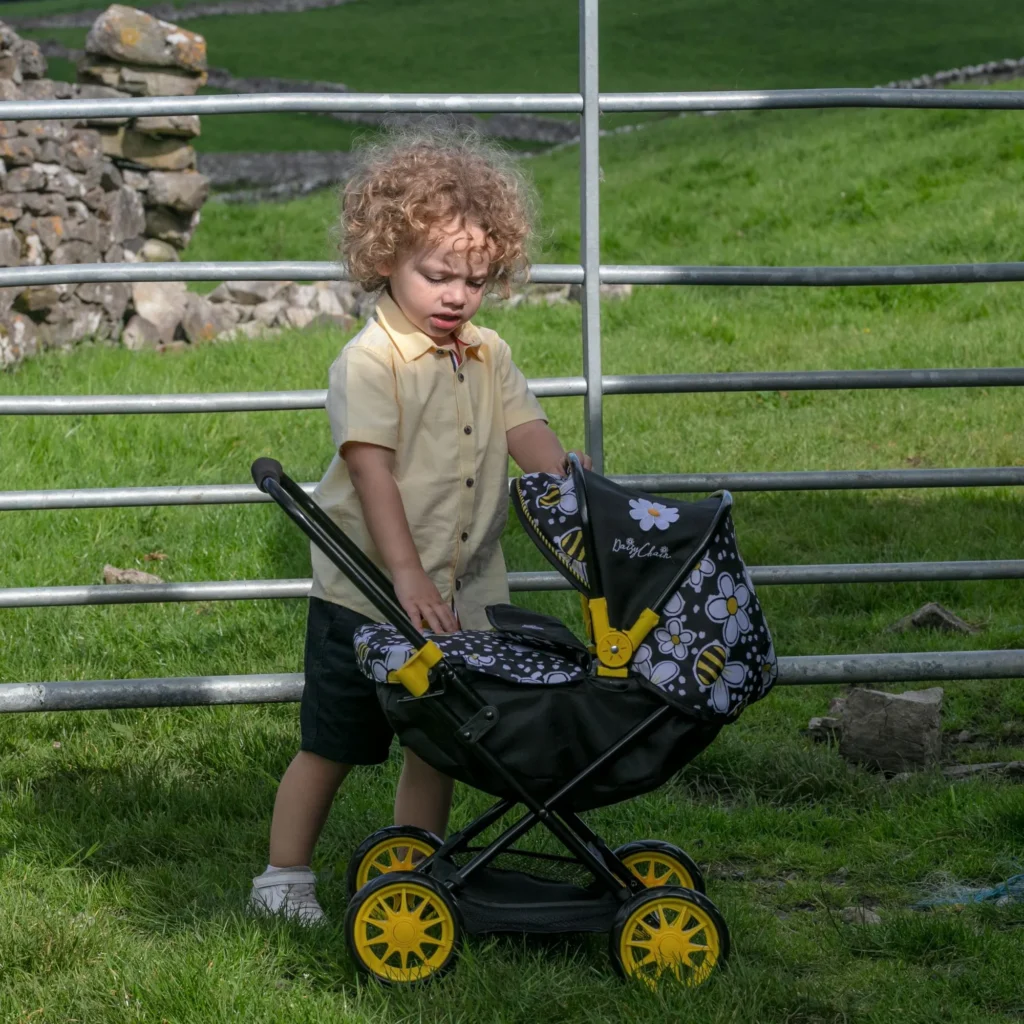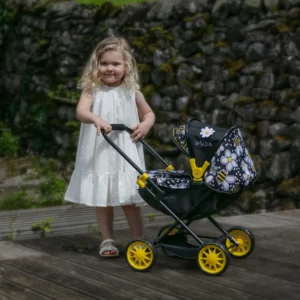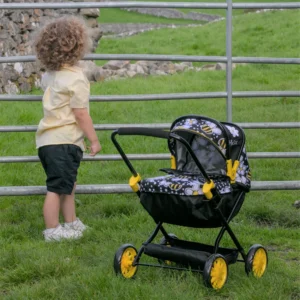There is no time more special than when you’re engaging with your child in play. The sheer joy, the creativity and the memories made are unmeasurably priceless. Prams for dolls not only contribute to the fantasy and enjoyment of playtime but also have a powerful impact on early development.
If you’re interested in learning more about pretend play, the benefits of prams for dolls and how to incorporate them into playtime, then keep reading!
How Does Playtime Evolve In Early Development?
In the early stages of development, play is so much more than a pastime or way to keep your little one occupied. Playtime contributes to cognitive, physical, social and emotional well-being development.
Through play, children can better their understanding of the world around them and nurture their personality through interaction.
Through play at an early development stage, children will grow:
- Confidence
- Self-esteem
- Resilience
- Social skills
- Independence
- Curiosity
- Coping mechanisms
When playing, children copy, listen and share experiences. Without realising, this helps them to explore their feelings and work out how they can best express themselves. By encouraging this behaviour, you support their early development, all while connecting and having fun!
The Role Of Pretend Play In Early Development
While some may refute the value of pretend play by suggesting it has ‘limited educational value’, we strongly disagree! And here’s why…
Through pretend play, children can comprehend how the world works! While you’re pretending to be a sick patient
in a doctor’s surgery and your little one is providing care and medication… They’re developing their understanding of what this role in society is. How it functions. Its purpose etc.
Children in the early stages of development will use pretend play to work out how to cope with real-life scenarios. Based on their creativity or your reactions, they can process and solve challenging life events.
Pretend play requires complex social and higher-order thinking skills. Off-handedly, children will start to negotiate, consider alternative perspectives, transfer and apply knowledge, delay gratification, lead, balance ideas with others, explore symbolism… the list really does go on. As complex as it sounds, all this comes naturally in pretend play.
Interaction is the key to lifelong success. Emotional intelligence, like understanding social cues, sympathising and regulating emotions, is an advanced skill. And let’s be honest, we can all struggle with this from time to time! The pressure is off in pretend play and your child can experiment with these things in a safe environment.
Benefits Of Prams For Dolls
Prams for dolls are an asset in playtime, as they perfectly facilitate pretend play.
While pushing their doll around in a pram may just seem like innocent fun, your child is actually learning the importance of responsibility, nurture and care.
In most cases, prams for dolls encourage movement. At an early age, your little one is desperate to explore and sometimes, toys that can’t be taken places can be left behind. Once they’re off, they’re off! Prams for dolls ensure your little one is getting the most out of their toys.
By encouraging movement, prams for dolls assist your little one in becoming more active. If we’re talking EARLY-early development, a pram can assist in encouraging your child’s first steps. While pushing around a pram, your child improves their balance, physical strength, spatial awareness and gross motor skills.
Incorporating Prams For Dolls In Playtime
We know that for parents, getting involved in pretend play and pushing around prams for dolls, could be initially strange. It requires you to revert to a child-like state of imagination which many won’t have embraced since, well, they were a child!
If you’re considering ways to incorporate prams for dolls in playtime, but just don’t know where to start, then don’t panic! We’ve got you.
The first step, is obviously, purchasing a doll’s pram. For that, you’re in the right place… Props in pretend play, like prams for dolls, help bring imagination to life! It helps your little one grasp how things function, work, are used etc.
At playtime, you can encourage pretend play by instigating scenarios. Your child will follow your lead! Children typically mimic behaviour, so if you are engaging in pretend play, they will too. This might only be necessary in early development, as after a while, your child may take over and take charge of play!
To maintain their engagement, you can include themes or scenarios based on what they’re interested in. For example, if your little one loves animals, then you could pretend to take their doll for a day at the zoo! Perk is, it’s much cheaper than the real one!
Prams For Dolls At Play Like Mum
We hope this blog has helped shed some light on how prams for dolls can aid early development. For more insight, visit our previous blog post covers developmental milestones and learning through play.
At Play Like Mum, we offer a wide range of prams for dolls, suited for ages 18 months to 13 years. Our prams are specially designed to fit the stage of your child’s development.
If you would like to know more about our products, then please feel free to call us on 01772 395207 or email us at info@playlikemum.com



